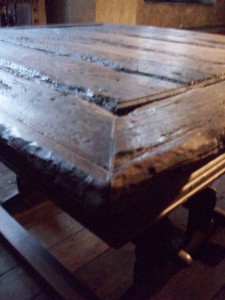Mark Batterson (see something beautiful 1.15) took a quick trip to Germany last week with a group of other pastors and leaders, including Chris Seay of Houston.
He was able to stand at the place where Martin Luther posted his 95 Thesis nearly 500 years ago on Reformation Day (last Friday). Very cool.
He posted a short followup on Sunday:
Here’s the table where Martin Luther had his infamous table talks. I got in trouble for taking a flash photograph. Oops! Pretty amazing to think that much of our theological thinking today can be traced back to some of the theological conversations around this table. Luther’s five solas and 95 Theses and Augsburg Confession reshaped 16th century theology. But his table talks were the bread and butter of a simple parish priest that was trying to be true to Scripture and true to God.
I really like Batterson’s comments here. Imagine, theology that shaped our view of God and religion discussed around a simple table by folks trying to be true to Scripture and true to God. Not one individual but a community of believers, sitting around a table, probably enjoying a meal and drinks and discussing the activity of God within their world.
What theology will be discussed and shaped around your dining room table this week or in your living room?
Can theology still be shaped and molded for our day and time – or has it been set in stone now that Martin Luther and his peers have said all that they could say?

I believe that theology can still shape and mould our time. It will perhaps not have the same length of legacy due to the speed and pace in which our world is constantly changing.
I have began to better understand the Catholic view of sacraments at the time of the Reformation. They believed that God’s grace was contained in the Sacraments. This was necessary as the catholic liturgy was conducted in Latin. A language that the majority of ordinary people didn’t understand. The emphasis had to be placed on participation rather than understanding. As the world began to change so to did the theology, and the practical implications of that theology.
I believe we are in similar times now. The world of Church and Christianity is almost conducted in a foreign language and style. We need to re-think our practices, what we do and why we do it. There has to be a 21st Century reformation. Nothing should go unquestioned. The church has to be the reforming church not just the reformed church.
We may perhaps go through a period of merely asking questions – where participation in the community of God is what is important, rather than having a systematic theology determined and worked out.
I believe that theology can still shape and mould our time. It will perhaps not have the same length of legacy due to the speed and pace in which our world is constantly changing.
I have began to better understand the Catholic view of sacraments at the time of the Reformation. They believed that God’s grace was contained in the Sacraments. This was necessary as the catholic liturgy was conducted in Latin. A language that the majority of ordinary people didn’t understand. The emphasis had to be placed on participation rather than understanding. As the world began to change so to did the theology, and the practical implications of that theology.
I believe we are in similar times now. The world of Church and Christianity is almost conducted in a foreign language and style. We need to re-think our practices, what we do and why we do it. There has to be a 21st Century reformation. Nothing should go unquestioned. The church has to be the reforming church not just the reformed church.
We may perhaps go through a period of merely asking questions – where participation in the community of God is what is important, rather than having a systematic theology determined and worked out.